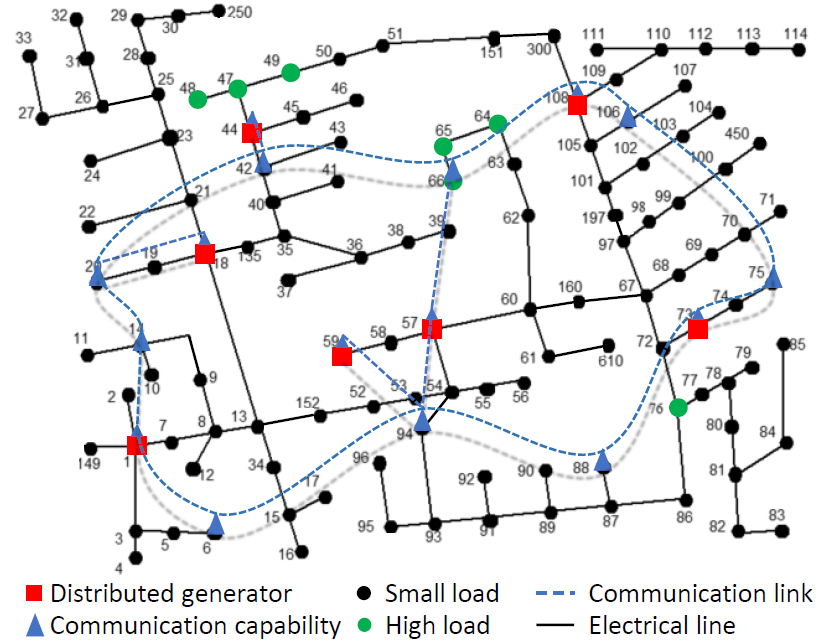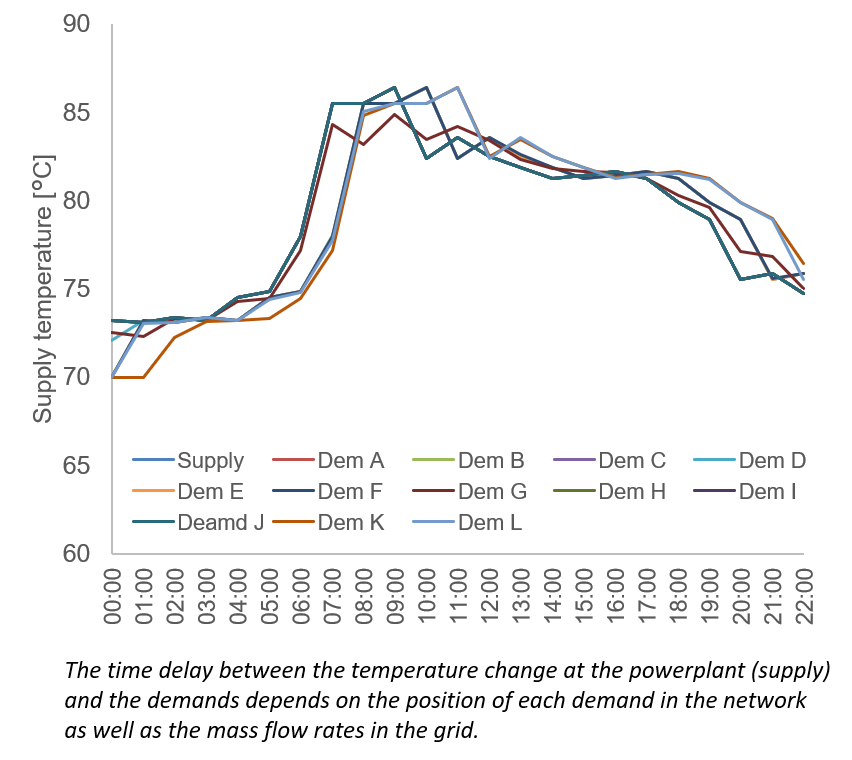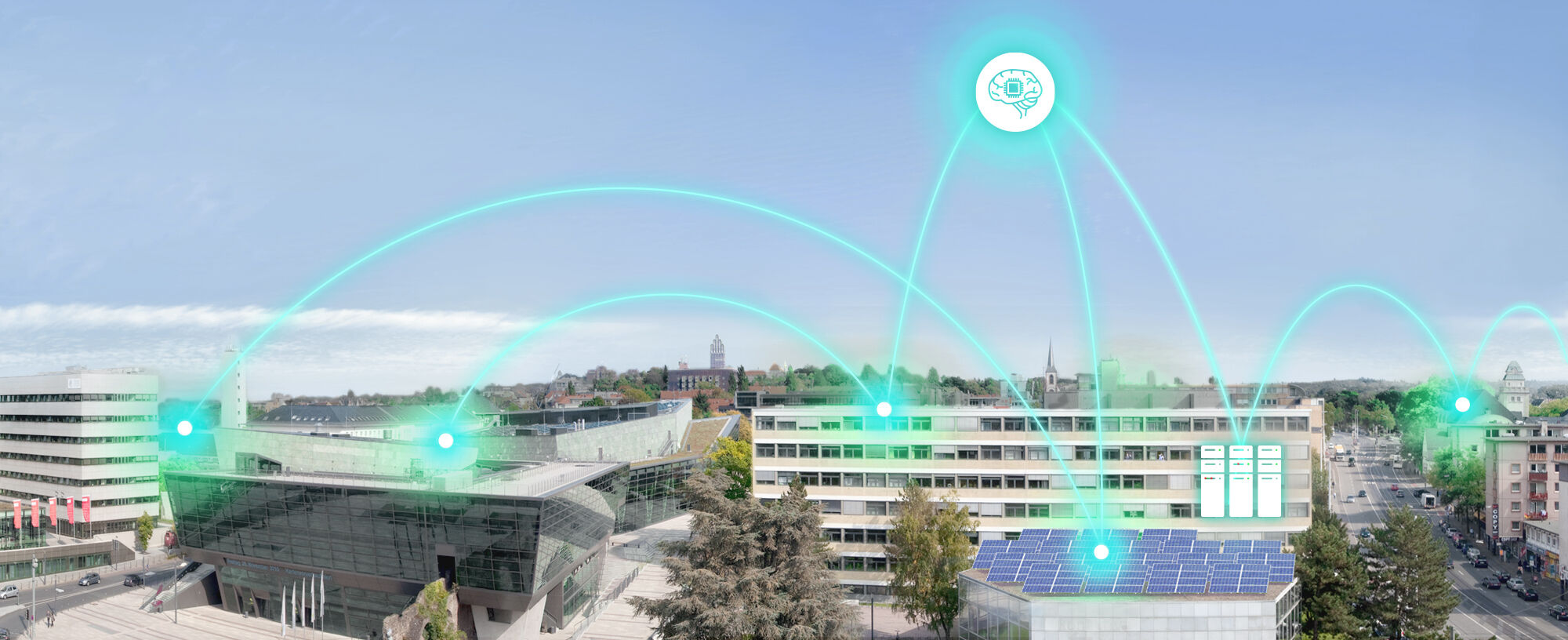Student: Elena Immen
Supervisor: Julia Barbosa
Time period: 03/14/2022 - 09/12/2022
Type: Bachelor Thesis
Die Aufteilung eines Energiesystemmodells in mehrere Regionen kann verschiedene Motivationen haben, z. B. die Abbildung begrenzter Transportkapazitäten zwischen den Regionen, den Betrieb durch verschiedene Akteure oder die individuelle Planung der einzelner Teile des Energiesystems. Der Energiebedarf der einzelnen Regionen und ihr Anteil an den gesamten CO2-Emissionen dient nicht nur als Indikator für die Energieeffizienz einer bestimmten Region, sondern kann auch Aussagen über die regional zu ergreifenden Dekarbonisierungsstrategien liefern.
Im Rahmen dieser Arbeit soll eine Methodik zur Berechnung von regionalisierten CO2 Intensitäten basierend auf einem bestehenden, regionalisierten Energiesystemmodell entwickelt und implementiert werden. Diese Methodik soll zur Analyse eines kleinen Versuchsenergiesystems und des Energiesystems des Campus Lichtwiese der TU Darmstadt angewendet werden.
Student: Florian Döllinger
Supervisor: Julia Barbosa
Time period: 04/18/2022 - 10/17/2022
Type: Master Thesis
The decarbonization of energy systems can be achieved with the integration of renewable energy (RE) sources, and the joint analysis of the different energy forms that comprise an energy system can lead to more cost efficient RE integration strategies. An increasing complexity in the energy markets can hence be expected as new players and new strategies emerge. In this context, local energy markets are an object of study, since they can reduce the barriers to entry for new small players, such as rooftop photovoltaic owners and waste heat recovery units.
Under the assumption of a perfect market, one can show that the selfish optimization of each player leads to the maximization of the total welfare. Due to the reduced number of market participants, the same is not valid in local energy markets and thus the influence of the participants´ behavior should be further investigated as well as possible regulation schemes to make local markets (close to) efficient.
In this thesis a local multi-modal energy market model for electricity and heat shall be further developed. This model should be used to study the dynamic of the markets under different characteristics ( e.g. numbers of players, demand curves.)
Student: Robin Derbach, Lukas Hugo, Thano Letsios, Eric Vierzigmann
Supervisor: Andreas Bott
Time period: 05/05/2022 - 10/15/2022
Type: Project Seminars Bachelor
The transition towards 4th generation district heating grids promotes the usage of flexible and decentralized heat producers. Cooperative behavior of all participants, producers and consumers will be required if losses should be minimized and the security of supply should not be endangered.
One important foundation for such grid-supporting behavior is easy and comprehensible access to information regarding the grid’s current state and performance. The aim of this Project Seminar is to provide this kind of network transparency based on simulation results. Therefore, an interactive visualization tool should be developed, which shows the grid’s current state as well as some key performance values.
The visualization platform should be primarily aim at providing information to grid operators and during grid expansion planning. However, it should also be intuitive enough, to be interpreted by nonprofessionals, in order to promote an active participation in the flexible operation of this grid by small consumers, i.e. private households.
Student: Marec Hessel
Supervisor: Martin Pietsch
Time period: 12/08/2021 - 06/07/2022
Type: Master Thesis
The central planner optimization approach of a recent publication on sequential grid restoration by merging microgrids under communication constraints is to be reformulated, into a distributed algorithm that can be executed in each microgrid separately. The algorithm is supposed to ensure a distributed restoration of the electricity grid independent of information of the grid- topology and state. Reducing the optimization problem to distributed microgrids leads to more realistic scenarios, at the possible expense of optimality. Suitable evaluation criteria (e.g. pareto principle) must be identified and, if necessary, formulated in order to classify and compare the results to other work. In order to do so, the centralized optimizatio n of the whole grid over all timesteps needs to be reduced to each microgrid and its discrete decisions possibilities in each timestep.

Student: David Silvan Hohner
Supervisor: Martin Pietsch
Time period: 05/01/2022 - 10/01/2022
Type: Bachelor Thesis
The electricity grid represents the backbone of our modern society. Once it is disrupted, the impact on every aspect of everyday life is enormous. From the use of electrical devices to refrigerate food, to the operation of the mobile network, to water supply, everything depends on electrical energy.
In order to map these dependencies in the form of scenarios, the investigation of past crisis can provide helpful insights. In particular, historical crises will be analyzed according to their temporal and spatial distribution in order to make a generalization of disasters and their impact on distribution networks.
Besides an intensive analysis of past crisis events regarding the co-dependencies of electricity, information and communication technologies and water infrastructure, the other half of this bachelor thesis consists of the development of a crisis generator for distribution network simulations.
The simulator should be able to expose any distribution network as a graph-based model to historic or generic scenarios and map the scenarios influence on the systems performance.
This generic approach will be a tool for future grid restoration evaluation and help to find resilient instead of robust solutions for cities infrastructure.
Student: Leonard Anderweit
Supervisor: Allan Santos
Time period: 06/02/2022 - 09/01/2022
Type: Pro-Seminars
This proseminar consists of a literature research over methods for distributed optimization of power flow in distribution grids. Research papers must be classified in terms of optimization algorithm, employed grid model and if security constraints are considered. Algorithms must also be compared in terms of implementation, robustness and achieved performance.
Student: Konstantin Preusser
Supervisor: Allan Santos
Time period: 05/23/2022 - 08/22/2022
Type: Pro-Seminars
This proseminar consists of a literature research over methods for robust placement of FACTS. Research papers must be classified in terms of the considered FACTS in the placement problem, the employed grid model, and the minimization target. Algorithms must also be compared in terms of implementation, robustness and achieved performance. This is a preliminary work that will be concluded by a bachelor thesis in the same topic.
Student: Jiali Huang
Supervisor: Allan Santos
Time period: 11/01/2021 - 04/30/2022
Type: Master Thesis
Modeling Uncertainty for Flexibility Management in Power Distribution Systems
Student: Leon Vincent Flöer
Supervisor: Julia Barbosa
Time period: 10/18/2021 - 04/18/2022
Type: Master Thesis
Pfade zur Hessischen Klimaneutralität
Deutschland hat sich zum Ziel gesetzt, die Treibhausgasemissionen bis 2045 auf null zu reduzieren, um die globale Erwärmung auf 1,5 °C zu begrenzen. Es wurden schon verschiedenen Studien auf nationaler Ebene entwickelt, um zu untersuchen, wie die Energiewende in Deutschland aussehen kann.Dennoch gibt es nur wenige Studien, die sich mit diesem Problem auf regionaler Ebene befassen, und noch weniger, die sich auf Hessen fokussiert. Als Standort eines bedeutenden Teils der deutschen Bevölkerung und Wirtschaft spielt Hessen eine wichtige Rolle bei der Erreichung des Ziels der CO2-Neutralität.
Im Rahmen dieser Arbeit wird eine kritische Studie zu den Möglichkeiten der Energiewende in Hessen durchgeführt. Die Studie wird mit Hilfe eines LP-Modells des hessischen Multienergiesystems durchgeführt. Dazu wird der Student aufgefordert, das bestehende LP-Modell des hessischen Multienergiesystems zu überprüfen und zu erweitern.
Student: Helena Sax
Supervisor: Andreas Bott
Time period: 04/04/2022 - 08/01/2022
Type: Bachelor Thesis
District heating grid can help achieving CO2-reduction goals by providing renewable heat in densely populated areas. In combination with power-to-heat applications they can also help to balance the fluctuating power supply by wind and solar feed in, since heat can be stored easily and cheaply in large quantities.
The relative low speeds at which water flows through the network lead to a high inertia of the distribution system and to a significant delay between the time actions taken at the powerplant, e.g. changing the supply temperature, and these changes influencing the consumers. Utilizing the full flexibility of district heating networks therefore requires predictive operation strategies and simulations which are able to incorporate uncertainties such as changes in demand patterns.
Quasi-Steady-State (QSS) power flow calculations simplify the simulations by neglecting time delays for changes in pressures and mass flow rates, which are much lower than the delays implied by temperatures propagating through the networks.
For a given demand time series, these models can be solved by iterative algorithms, which comes at a high computational cost. For sampling-based applications, the simulations are solved repeatedly for randomly sampled demands. We can exploit this randomness for solving the QSS-system by sampling from a proxy-distribution. If the proxy-distribution is close enough to the true distribution, the results can be adjusted afterwards without losing much sampling efficiency.
For the QSS-system the mass flows at the consumers place should be such a close proxy-distribution which provides advantages for the QSS-calculations. Fixing the mass flows allows to separately solve the hydraulic equations, which were assumed to act instantiations and can therefore be solved for each time step independently. The time coupling thermal equations can then be solved in a second step, removing the need to iterate between the thermal and the hydraulic system.
The task of this thesis is to develop a representation of the QSS-equations which is best suited for the two steps solving approach outlined above as well as a corresponding solving algorithm for the QSS-system. The algorithms should be implemented in Python utilizing the Tensorflow package.

This thesis can also be started as Pro-Seminar or Project-Seminar
Student: Konstantin Preusser
Supervisor: Allan Santos
Time period: 07/01/2022 - 09/30/2022
Type: Project Seminars Bachelor
The goal of this project seminar is to extend the algorithm for placement of phase-shifting transformers (PST) in [1] such that the controlled power grid is also feasible when N-1 contingencies are considered. This is particularly challenging due to the combinatoric nature of N-1 problems which are formulated as very large (mixed-integer) linear programs. The proposed solution should be tested on a reference grid and be compared against an appropriate baseline.



